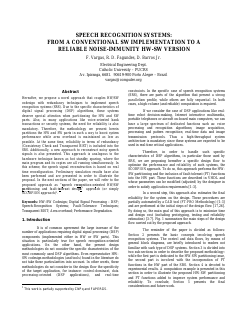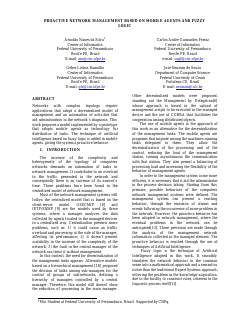
XIX Simpósio Brasileiro de Telecomunicações

Speech Recognition Systems: From a Conventional SW Implementation to a Reliable Noise-Immunity HW-SW Version
Fabian Vargas, Rubem Dutra Fagundes, Daniel Barros Junior
DOI: 10.14209/sbrt.2001.25100304
Keywords: HW-SW Codesign; Digital Signal Processing – DSP; Speech-Recognition Systems; Fault-Tolerance Techniques; Transparent BIST; Area overhead; Performance Degradation
Abstract
"Hereafter, we propose a novel approach that couples HW/SW codesign with redundancy techniques to implement speech recognition systems (SRS). Due to the specific characteristics of digital signal processing (DSP) algorithms, these systems deserve special attention when partitioning the HW and SW parts. Also, in many applications like voice-oriented bank transactions or security systems, the need for reliability is also mandatory. Therefore, the methodology we present herein partitions the HW and SW parts in such a way to boost system performance while area overhead is maintained as low as possible. At the same time, reliability in terms of redundancy (Consistency Check and Transparent BIST) is included into the SRS. Additionally, a new approach to reconstruct noisy speech signals is also presented. This approach is analogous to the hardware technique known as hot standby sparing, where the main program and its copies are all running simultaneously. In this scheme, the speech signal reconstruction is based on real time reconfiguration. Preliminary simulation results have also been performed and are presented in order to illustrate the proposal. In the next sections of the paper, we will refer to the proposed approach as “speech recognition-oriented HW/SW partitioning and fault-tolerant design” approach (or simply SCORPION approach)."Download

Proactive Network Management Based on Mobile Agents and Fuzzy Logic
Arnoldo Nunes Da Silva, Carlos André Guimarães Ferraz, Geber Lisboa Ramalho, José Neuman De Souza
DOI: 10.14209/sbrt.2001.28200313
Keywords:
Abstract
"Networks with complex topology require applications that adopt a decentralized model of management and an automation of activities that aid administrators in the network’s diagnosis. This work proposes a model implemented by a prototype that adopts mobile agents as technology for distribution of tasks. The technique of artificial intelligence based on fuzzy logic is added in mobile agents, giving the system a proactive behavior."Download

Uma Proposta de Especificação Formal em SDL de Uma Sessão de Acesso TINA
Rafael Paoliello Guimarães, Walter Da Cunha Borelli
DOI: 10.14209/sbrt.2001.42500095
Keywords: TINA SDL Arquitetura de Serviços
Abstract
"O trabalho apresentado neste artigo consiste na especificação formal orientada a objetos da Sessão de Acesso em uma arquitetura de serviços TINA (Telecommunications Information Networking Architecture) utilizando SDL (Specification and Description Language) com o objetivo de conferir um caráter comportamental ausente nas especificações em ODL (Object Description Language) descrita nas recomendações TINA. Sendo assim, é proposto neste artigo um novo mapeamento de ODL/IDL para SDL, com o qual é possível modelar os objetos componentes da arquitetura TINA de uma forma mais adequada. Após a especificação proposta para a Sessão de Acesso TINA, são apresentados exemplos de simulações e sua completa validação."Download